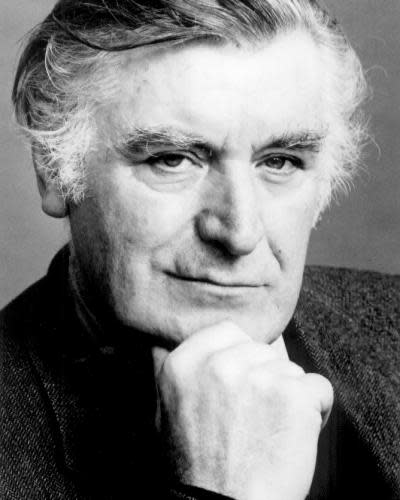Robert Habeck: from translating English verse to German high office

Ted Hughes felt the soon-to-be minister for economy and climate was ‘on the same wavelength’
The man who will spend the next four years trying to bring about a green transformation of Germany’s coal-hungry industry once faced another daunting challenge in a previous, less publicly exposed career: translating the most controversial poems in recent British history from English into German.
As Germany’s next vice-chancellor and minister for economy and climate, Green party co-leader Robert Habeck will be one of the most powerful politicians not just in Germany but Europe, overseeing a new super-ministry that will span general economic policy, renewable energy and the expansion of the country’s electricity grid, with a mooted budget upwards of €10bn.
The final names were announced on Monday in Scholz’s cabinet, which will be gender-balanced and have the country’s first female interior minister in Social Democrat Nancy Faeser and first female foreign minister in Annalena Baerbock, co-leader of the Greens alongside Habeck. It also includes the first German minister with Turkish roots, in new agriculture minister Cem Özdemir.
Yet 25 years ago, Habeck and his wife Andrea Paluch, both literature graduates, still worked as jobbing translators specialising in contemporary English verse.
After winning a prestigious translation prize for their rendering into German of the work of Merseyside poet Roger McGough in 1997, the pair were commissioned a year later to translate Ted Hughes’ newly published Birthday Letters: the collection in which the then British poet laureate for the first time broke his silence about his tumultuous relationship to his former wife, poet Sylvia Plath with whom he led the literati set of 1950s Britain.

Hughes had largely withdrawn from public life at this point, following the publication of books and articles that largely held him responsible for Plath’s suicide 35 years earlier. In a 2005 article for Süddeutsche Zeitung, Habeck and Paluch recalled how they communicated with Hughes by faxing his agent pages of multiple choices for difficult-to-translate passages.
“He would have only needed to tick the right solution, we didn’t expect more of him in his tragic state of solitude,” they wrote.
Instead, Hughes sent Habeck and Paluch a series of long letters expanding not just on linguistic nuance but the British landscapes he was writing from (the Outer Hebrides was “very nice for bicycles”), his belief in the existence of “a population of mountain lions, some of them black” in East Anglia, and his ouija board, which not only helped him write some of his verse but nearly won him “about £2m” in betting on football matches.
In the letters, which Habeck shared with the Guardian following an interview in 2019, Hughes apologised that some of his poetic references to other esoteric practices like telepathic communication and extrasensory perception may go over his translators’ heads: “I’m not sure my careful description makes things clear even to an English reader,” he wrote.
After Hughes death from a heart attack on 28 October 1998, shortly after what would have been Plath’s 66th birthday, his second wife Carol sent Habeck and Paluch a note thanking them for their work, saying the British poet had “felt you were on the same wavelength”.
Habeck would join the Green party four years later, eventually attaining his first high-ranking political office as minister for energy, agriculture, environment and rural areas in the northern state of Schleswig-Holstein in 2012.
He will be sworn in to his first ministerial post at national level this Thursday, after his Green party, the Social Democratic party (SPD) and the liberal Free Democratic party (FDP) backed a coalition agreement.

 Yahoo Finance
Yahoo Finance 